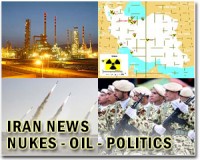 |
Tehran (AFP) Oct 25, 2009 UN inspectors will visit Iran's controversial second uranium enrichment plant on Sunday, as US President Barack Obama garnered support for a separate deal with Tehran to end the crisis over its nuclear programme. A four-member team of inspectors from the International Atomic Energy Agency (IAEA) arrived early Sunday in Tehran to inspect the uranium plant being built inside a mountain near the Shiite holy city of Qom, south of the capital. The plant's disclosure on September 21 by Iran to the IAEA unleashed a wave of global outrage against Tehran, with Obama warning the Islamic republic would face "increased pressure" if it fails to address concerns over its atomic programme. Iran is already enriching uranium -- the most controversial aspect of its nuclear programme -- for several years at another plant in the central city of Natanz, in defiance of three sets of UN sanctions. Western powers are mainly concerned about Iran's uranium enrichment drive, suspecting its ultimate aim is to make an atom bomb, a charge strongly denied by Tehran. Enriched uranium produces fuel for civilian reactors, but in highly extended form can also make the fissile core of an atomic weapon. IAEA chief Mohamed ElBaradei has already criticised Iran for what he said was its late disclosure of the Qom facility's existence. "Based on the IAEA regulations, all countries should inform the IAEA on the day they begin construction" of a nuclear plant, he said during a visit to Tehran on October 4. Iran, which informed the agency about a year after building began, said its disclosure obligation only began 180 days before it placed any nuclear material inside the facility. On Saturday, Mehr news agency, quoting an unnamed Vienna-based official, said the IAEA inspectors will "compare the information given by Iran (about the Qom plant) with the facility during their three-day visit." Iranian officials claim that at the Qom plant they intend to install new generation centrifuges -- the device which enriches uranium at supersonic speed. The IAEA inspection comes as Obama spoke to his Russian and French counterparts on Saturday to garner support for a separate deal to end the crisis over Iran's nuclear programme. Washington said Obama spoke to Russia's Dmitry Medvedev and France's Nicolas Sarkozy where all men "affirmed their full support" for a UN-brokered deal which aims to ship out Tehran's existing stock of low-enriched uranium (LEU). Western powers are concerned that the material, if not shipped out, could be further enriched in-house by Iran to weapons grade. The full details of the proposed deal have not been released, but France has said it calls on Iran to transfer 1,200 kilos of LEU from its Natanz plant to Russia by the end of 2009. Russia would then enrich the material to the higher 19.75 percent needed as fuel for a Tehran research reactor which makes radio-isotopes for medical use. Diplomats say Moscow would sub-contract to France the process of turning this Russian-enriched uranium into fuel rods for the reactor. Obama is said to be cementing positions of Russia and France, two key members of the group who have been negotiating with Iran. The group has often seemed at odds about the need for new sanctions against Tehran. But in recent weeks Russia and the United States have appeared to have narrowed their positions, as Moscow publicly acknowledged that sanctions are sometimes necessary. Urging Iran to embrace the deal, the three leaders also "discussed the importance of all parties accepting the proposal so that implementation can begin as soon as possible," the White House said. The three spoke after Tehran ignored a Friday deadline to respond to the offer, saying it would make its decision in the next week. Top Iranian officials have questioned the deal in apparent contradiction to President Mahmoud Ahmadinejad who himself had originally proposed it. Iranian parliament speaker Ali Larijani accused that Western powers were trying to "cheat" Tehran through the deal, while powerful MP Alaeddin Borujerdi said Iran would be "better" off buying the nuclear fuel rather than entering into this uranium exchange deal. Share This Article With Planet Earth
Related Links Learn about nuclear weapons doctrine and defense at SpaceWar.com Learn about missile defense at SpaceWar.com All about missiles at SpaceWar.com Learn about the Superpowers of the 21st Century at SpaceWar.com
 Top Iran officials question UN-brokered nuclear deal
Top Iran officials question UN-brokered nuclear dealTehran, Iran (AFP) Oct 24, 2009 Top Iranian figures criticised on Saturday a UN-brokered deal to produce nuclear fuel for Tehran from its own partly enriched uranium, apparently challenging what President Mahmoud Ahmadinejad himself has proposed. Parliament speaker Ali Larijani said Western powers are trying to "cheat" Iran through the deal, under which Tehran would export low-enriched uranium (LEU) to be further enriched ... read more |
|
| The content herein, unless otherwise known to be public domain, are Copyright 1995-2009 - SpaceDaily. AFP and UPI Wire Stories are copyright Agence France-Presse and United Press International. ESA Portal Reports are copyright European Space Agency. All NASA sourced material is public domain. Additional copyrights may apply in whole or part to other bona fide parties. Advertising does not imply endorsement,agreement or approval of any opinions, statements or information provided by SpaceDaily on any Web page published or hosted by SpaceDaily. Privacy Statement |